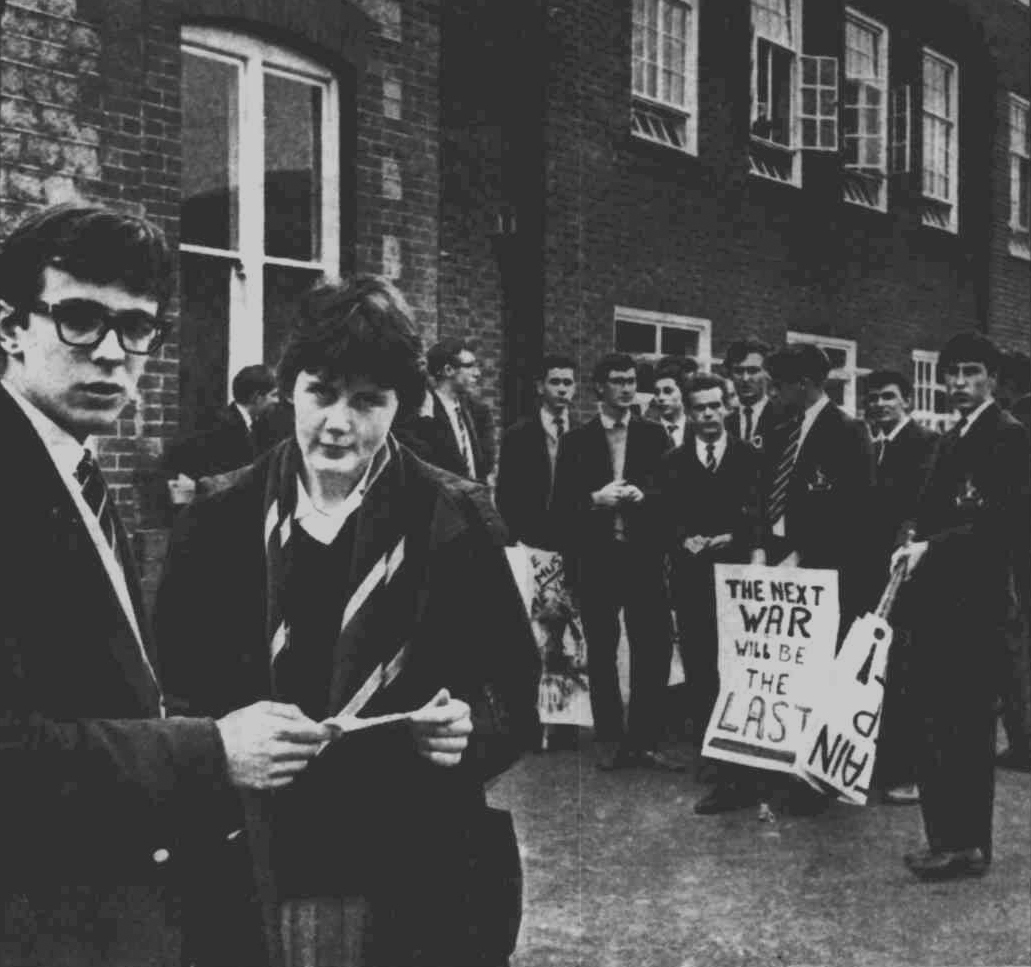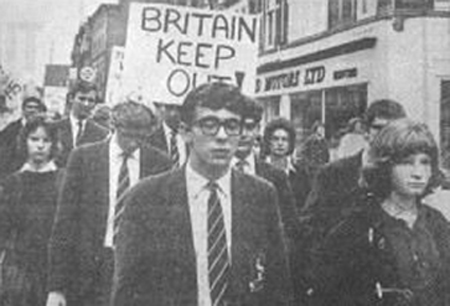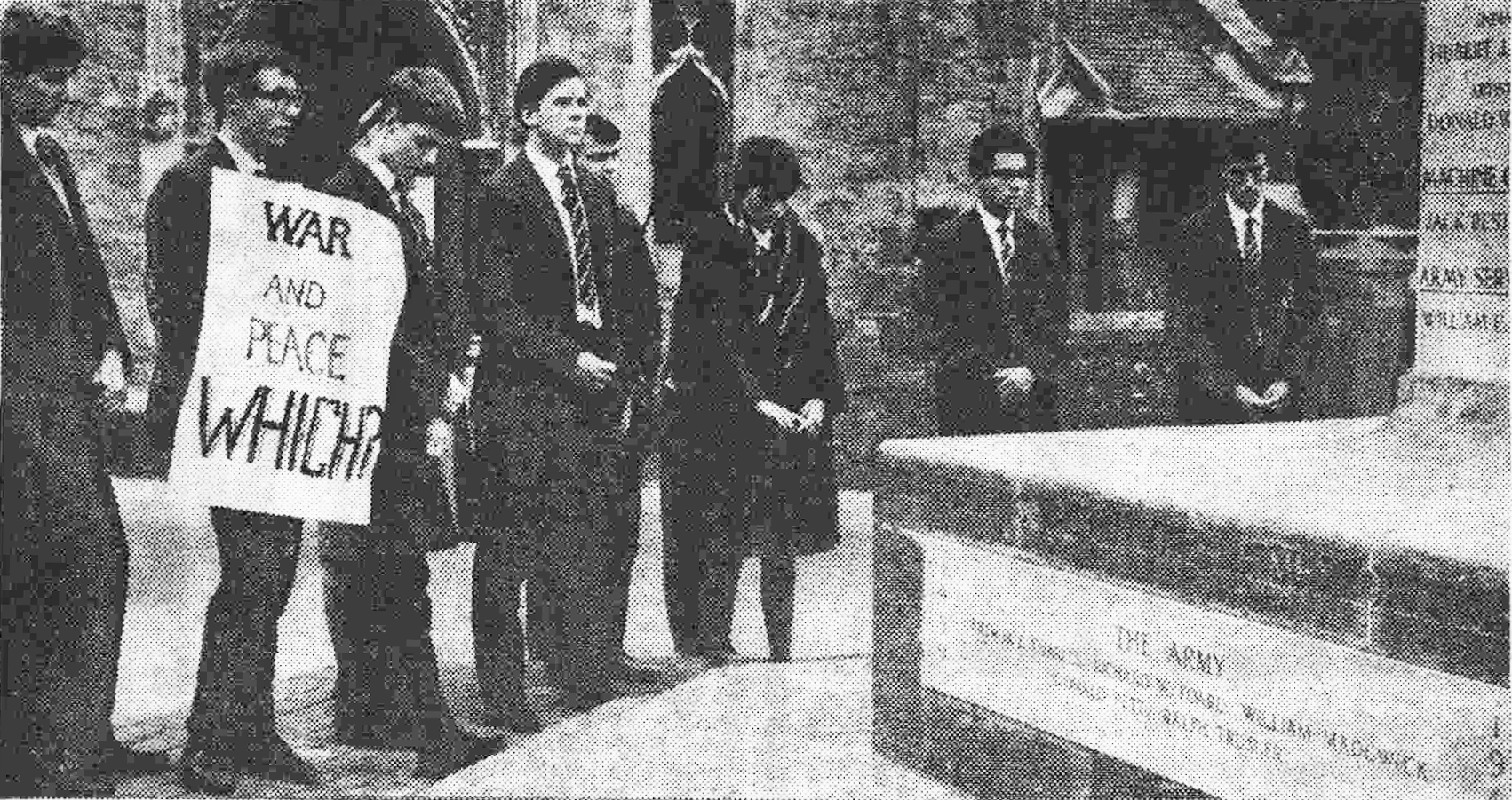Sixth Goes On Strike
Evening News, Wednesday October 24, 1962
Her Majesty’s Government received a sharp note from Sussex on the world situation to-day. Forty sixth-form boys and girls at Midhurst Grammar School, where H. G. Wells was a pupil and later assistant master, published it after informing their headmaster that they would go on strike for two days.
The note read: “We, the senior sixth formers at Midhurst Grammar School, deplore the way the world situation is being allowed to deteriorate into one in which war is imminent and demand that Her Majesty’s Government take every possible step to end this state of affairs. In order to impress the British public of our convictions we are not participating in any lessons for two days.”
The strikers were making contact with other schools in the neighbourhood in an effort to spread the strike and were later marching through Midhurst. All the school prefects were involved but they promised to carry out their duties.
Headmaster Mr. Norman Lucas said: They came and saw me after assembly and told me their views. They were very courteous. These are 17 and 18-year-old pupils -you cannot offer them the cane.” Mr. Lucas added that he intended to take no action for the present.
The head boy, Robin Marriner, aged 18, said: “Sixth formers are supposed to be the intelligentsia of the younger generation and we thought that by expressing our deep concern we might influence the Government and public opinion so that positive action is taken to prevent the possibility of war. We had a collection amongst ourselves to raise the bus fare to send some of the boys and girls to other schools at Chichester, Horsham and Petersfield. We want sixth-formers there to take similar action.”
The headmaster Mr. Norman Lucas said: “I told them I could not approve of them absenting themselves from lessons. My instructions were for them to continue. They were courteous in the way they replied but said they felt they could not so so.” Although the boys and girls refused to do their lessons they continued with their individual studies.
The school, which has more than 350 pupils, was founded nearly 300 years ago.
The Sixth down pens over blockade
Daily Herald, Thursday, October 25, 1962
After prayers at Midhurst Grammar School, Sussex, yesterday the head boy led a deputation to the headmaster’s study. He said something which would have staggered – and probably delighted – Old Midhurstian H. G. Wells.
With proper respect and deadly seriousness, he reported that the Sixth Form had decided to go on a two-day no-lessons strike in protest against the United States’ action over Cuba.
And last night other schools in West Sussex and over the border in Hampshire were considering taking similar ‘down-pens’ action.
Midhurst Grammar School is co-educational and has 400 pupils.
This is how the strike went:
- About 32 boys and six girls from the Upper Sixth refused to attend any lessons. They carried out all their usual duties as prefects.
- They sent a petition to the Prime Minister protesting against the American blockade of Cuba and pleading with him to intervene in the cause of peace.
- They marched through the streets of Midhurst carrying slogans – banners, held aloft on hockey sticks.
- They stood in silence for 15 minutes around the local war memorial.
- They canvassed neighbouring schools in West Sussex and Hampshire for support.
‘I was flabbergasted when they came to me,’ said Norman Lucas, the headmaster. ‘I told them I did not agree with their decision. But I shall not take any disciplinary action. They are all very sincere – and here we teach them to think for themselves.’
The head boy, Robin Marriner – ‘a magnificent boy,’ said the Head – who will shortly sit for an entrance examination to Brasenose College Oxford, said: ‘We first thought of taking action when we heard the news on Tuesday. A few of us debated it well into the night. We then held a meeting after Assembly this morning. The strike was the result. Whether or not we shall continue after Wednesday depends on the international situation – and what Mr. Macmillan does.’
And what do their elders think of it? Robin’s father, Mr. Jesse Marriner, a farmer, told me: ‘I told my boy to go ahead if he thought what he was doing was right. I am fully in sympathy with their feelings but I do not think their protest will do much good.’
A member of the Board of Governors, local ironmonger Mr. Geoffrey Allin, said angrily: ‘The governors must hold a special meeting to consider the pupils’ action. The demonstration should never have taken place. It certainly would not have done when I was there.’
Eighteen boys in the upper sixth did not join the strike.
Cuba protest – Schoolchildren march off on a strike
Daily Express, Thursday 25 October 1962
All over Britain yesterday, protests flared against the threat of war over the Cuban crisis. And the first was a strike by schoolchildren.
At Midhurst, Sussex, 40 grammar school sixth-formers – boys and girls – boycotted lessons because of America’s action. Led by 18-year-old head boy Robin Marriner, they told their head master that they were starting a two-day strike. Then they sent couriers to other West Sussex and Hampshire schools to try to persuade the pupils to join in.
The head boy and girl at Bedales co-educational school, Petersfield, sympathised and they would hold a meeting about it. At Chichester High School for Boys the courier was “removed.” At the girls’ school the head mistress refused to let the couriers speak. At Horsham Grammar School prefects decided: No action. Not all agreed that Kennedy was wrong.
Meanwhile in Midhurst 30 blazered boys and girls carried anti-war posters on hockey sticks on a two-mile march. It finished in silence at the war memorial at 3 p.m. – the time the U.S. blockade began.
Head master Mr. Norman Lucas said: “The pupils behaved with dignity and I am not going to discipline them. This is what they believe in.”
No-War Strike in the Sixth
Daily Mirror, Thursday, October 25, 1962
Sixth-Form schoolboy Robin Marriner walked into his headmaster’s study yesterday to say: “Excuse me, sir, but we are going on strike. It’s Cuba … We must help to stop a war.” And with that, Robin and thirty-nine other senior pupils at Midhurst Grammar School, Sussex, began their protest.
They marched to the local war memorial where they kept a solemn ten-minute vigil. One of their banners read: “The next war will be the last.” And for the next two two days the youngsters will not attend lessons, although they will do private study. Headmaster Norman Lucas says he does not intend to take any disciplinary action.
Aims achieved, say sixth-formers
Huddersfield Daily Examiner, Thursday October 25, 1962
Forty Midhurst (Sussex) Grammar School sixth-formers were still “on strike” today in protest against America’s attitude to the Cuban situation. They decided, however, not to stage any more demonstrations. They have also agreed to return one day earlier from their half-term holiday to make up their studies. The head boy, eighteen-year-old Robin Marriner, thanking the “strikers” for their support, said: “I think we have achieved what we set out to do.”
Girls in a blockade walk-out
Daily Mirror, Friday, October 26, 1962
Sixty grammar school girls yesterday staged a walk-out in protest against the blockade of Cuba. They marched out of the Glanmor girls’ grammar school at Swansea an hour before their lessons finished. They are expected to go back today.
The forty sixth-form boys on strike over Cuba at Midhurst Grammar School, Sussex, yesterday pooled their pocket money to collect £2. They used the money to send cables to Russia’s Mr. Krushchev and Mr. Kennedy, the American President. The cables said: ‘We demand negotiations before force. Youth wants to live.’
PROTEST ROUND-UP: Armed police guarded the US Embassy in Paris as 500 people chanted anti-Kennedy slogans. Pope John made a Vatican radio appeal for negotiation. Moscow students held a protest meeting and a demonstration.
60 pupils stage Cuba walk-out
Daily Express, Friday October 26, 1962
The 40 striking grammar school pupils at Midhurst, Sussex, sent protest cables to Mr. Krushchev and Mr. Kennedy: “We demand negotiations before force. Youth wants to live.” Eighteen-year-old head boy Robin Marriner, leader of the strikers, said: “We paid £2 for the cables out of our strike fund. We’ve had a whip round among the lads.”
Scores of telegrams and letters – almost all supporting the strike arrived at the 400-pupil school. One from Bognor High School, Sussex, said the fifth form there was in “full agreement” with the strike.
Discipline upheld
The Sphere, December 8, 1962
Mr. Lucas, the Headmaster of Midhurst Grammar School, where the ‘Great Strike’ took place at the height of the Cuban crisis, has received backing from the School Governors and the West Sussex Education Committee, for the disciplinary action he took against the strikers. Both bodies thought it right to acknowledge their appreciation of the ‘sincerity’ of the strikers. The disciplinary measures taken do not appear to have been unduly severe. The children involved lost a day of their half-term holiday. The right of a headmaster to discipline his pupils has been therefore satisfactorily, if mildly, upheld.
I had no idea that this right (indeed, duty) of a headmaster was a matter for confirmation by higher authority. But so it clearly was. Which makes it easier to understand the haywire state of discipline in more adult fields of endeavour where strikes and subversion are the order of the day, as they have been at Dagenham.
Clearly, the right of the ‘head’ to discipline in proven cases of subversive actions is by no means accepted as a truism anywhere on earth today, but Mr. Lucas’s mild riposte was surely not victimisation. Should he have welcomed back the offenders with full honours and sixth-form privileges, while higher authorities deliberated at greater length and with more meticulous scrutiny of precedents whether any scintilla of right remains to a boss to enforce discipline under present day conditions?



